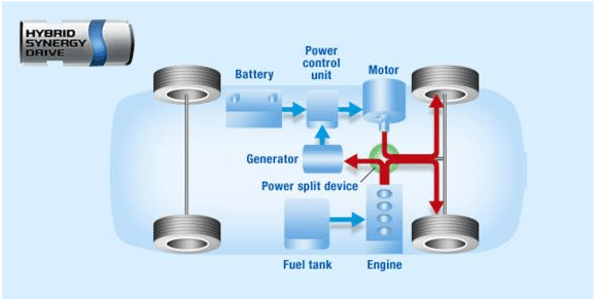“Toyota Hybrid” technology, with ethanol, is custom made for the 21st century’s move from fossil fuels to renewable energy. Also, it comes without the massive disruption that will be caused by transitioning to fully-electric vehicles.

Oil-based fuels can be almost completely eliminated via ethanol. Brazil has shown the way to get started by being able to use higher ethanol mixes. The aim should be to get to 100% Ethanol (E100).
Fully-electric vs Ethanol
Almost all the infrastructure is in place to move to ethanol as the primary fuel for all vehicles, whereas fully-electric vehicles will require a virtual doubling of the demand for electricity. In addition, fast electric charging stations would need to be built right across every nation, including nations with large open spaces like Australia, most of Africa, north and south America, and in Asia.
While fully-electric vehicles are increasingly popular in Western countries, it is difficult to see them as a global replacement for petrol and diesel fuelled vehicles:
- The demand for electricity from this approach will require a much larger electricity-generating sector. This will be difficult for countries that are already electricity poor, especially in the absence of relatively cheap coal-fired generators.
- The demand for finite resources in order to build fully-electric cars will create supply difficulties, with the world possibly coming close to exhausting such resources. The supply of cobalt is already under stress and alternatives are being developed. The future supply of copper and lithium could also be a limiting factor.
- Fully-electric cars at present are much more expensive that vehicles running on Toyota Hybrid technology. While this cost differential should reduce over time as a result of manufacturing efficiencies, it also likely that supply problems could cause the opposite outcome.
On the other hand, vehicles running on 100% ethanol are technically viable and could be quickly introduced.
Supply of ethanol
Currently most nations using ethanol as a fuel source use it as a mix with gasoline as 15% ethanol and 85% gasoline. This level of supply should be relatively easily sustainable. However, there is concern that, with a higher level of ethanol in the mixture, supply will be an issue.
Producing ethanol from crops such as sugar cane and corn, while relatively competitive, demands too much land to be a complete solution. Less land-intensive approaches are required. A viable method of obtaining ethanol from bamboo has been explored: perhaps this will help. Ethanol from algae has been explored, but it is not yet viable. It is accepted that more research is required to develop a solution that will enable the transition to 100% ethanol.
Sure, there are problems in the land required for 100% ethanol, but alternative methods of production of ethanol are being explored. This problem should not be too hard in a world that has been able to produce three or more vaccines for COVID-19 within twelve months.
The role of Toyota Hybrid technology
The Toyota Hybrid system combines two power sources. When the engine is running, it charges the battery via the generator; when driving conditions allow it, such as in slow-moving traffic, the generator can cut out the petrol engine and let the electric motor take over for zero-emissions travelling. The sophisticated engine management system can sense when the car is stopped and will switch off the engine to conserve power and cut emissions, automatically starting up again when needed.
The primary advantage of this system when using ethanol as a fuel is the reduction in the amount of ethanol used. If a 40% cut in fuel usage was available then the current supply of ethanol of current vehicles were running on E15 could be immediately extended to E25.
In addition, Toyota Hybrid technology significantly reduces the demand for battery materials, since its batteries provide supplementary power, rather being the only power source.
Less resources used to make and power a vehicle is a win-win for the climate and for the earth. One wonders why the Toyota Hybrid technology is not adopted by all car manufacturers. It is a brilliant solution, which could be a real contributor to a difficult global problem: oil-based fossil fuels.

3 thoughts on “Toyota Hybrid technology – a 21st century solution”